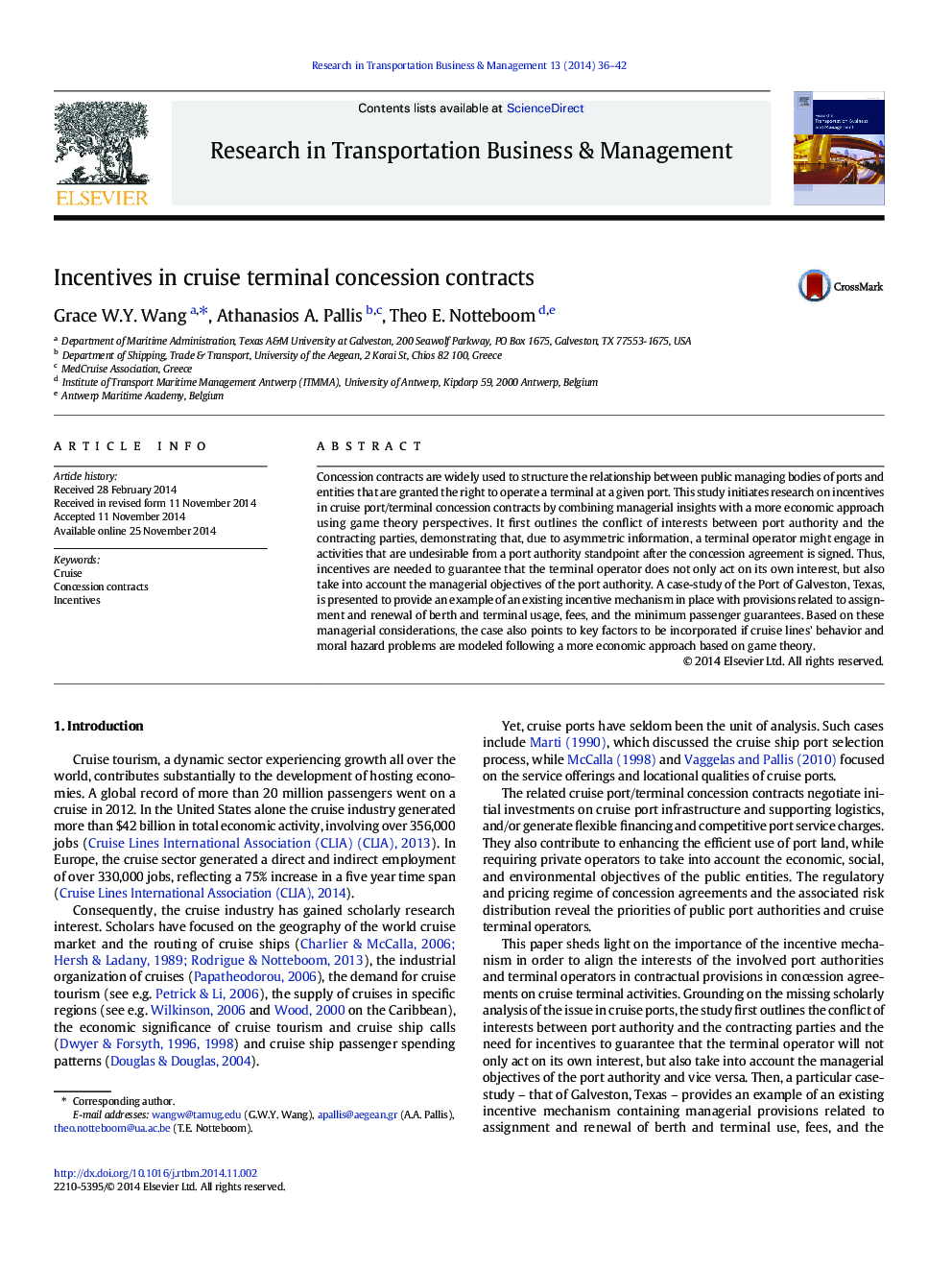| کد مقاله | کد نشریه | سال انتشار | مقاله انگلیسی | نسخه تمام متن |
|---|---|---|---|---|
| 7410475 | 1481601 | 2014 | 7 صفحه PDF | دانلود رایگان |
عنوان انگلیسی مقاله ISI
Incentives in cruise terminal concession contracts
ترجمه فارسی عنوان
انگیزه در قراردادهای قرارداد ترمینال کروز
دانلود مقاله + سفارش ترجمه
دانلود مقاله ISI انگلیسی
رایگان برای ایرانیان
کلمات کلیدی
کشتی تفریحی، قراردادهای قراردادی، انگیزه،
ترجمه چکیده
قراردادهای قراردادی به طور گسترده ای برای ساختن ارتباط بین سازمان های دولتی از بنادر و اشخاصی که حق استفاده از ترمینال را در یک بندر مشخص داده اند، استفاده می شود. این مطالعه تحقیق در مورد مشوق ها در قراردادهای قرارداد پورت کورس / ترمینال را با ترکیب دیدگاه های مدیریتی با رویکرد اقتصادی بیشتر با استفاده از دیدگاه های نظری بازی آغاز می کند. این اولین تضاد منافع بین مقامات پورت و طرفهای متعاهد را مشخص می کند، نشان می دهد که به دلیل اطلاعات نامتقارن، یک اپراتور ترمینال ممکن است در فعالیت هایی قرار بگیرد که از نظر موقعیت بندر بندر پس از امضای قرارداد اجاره نامه نامطلوب است. بنابراین، انگیزه ها لازم است تا تضمین شود که اپراتور ترمینال نه تنها به نفع خود عمل کند، بلکه اهداف مدیریتی مربوط به قدرت بندر را نیز در نظر می گیرد. یک مطالعه موردی از بندر گالوستون، تگزاس، ارائه شده است به عنوان مثال از یک مکانیزم انگیزه موجود در محل با مفاد مربوط به اختصاص و تجدید استفاده از اسکله و ترمینال، هزینه ها، و حداقل تضمین های مسافر ارائه شده است. بر اساس این ملاحظات مدیریتی، این مورد همچنین به عوامل کلیدی اشاره می کند که اگر رفتار خطوط کروز و مشکلات خطر اخلاقی بر اساس یک رویکرد اقتصادی تر مبتنی بر نظریه بازی مدل سازی شود، اشاره می شود.
موضوعات مرتبط
علوم انسانی و اجتماعی
مدیریت، کسب و کار و حسابداری
کسب و کار و مدیریت بین المللی
چکیده انگلیسی
Concession contracts are widely used to structure the relationship between public managing bodies of ports and entities that are granted the right to operate a terminal at a given port. This study initiates research on incentives in cruise port/terminal concession contracts by combining managerial insights with a more economic approach using game theory perspectives. It first outlines the conflict of interests between port authority and the contracting parties, demonstrating that, due to asymmetric information, a terminal operator might engage in activities that are undesirable from a port authority standpoint after the concession agreement is signed. Thus, incentives are needed to guarantee that the terminal operator does not only act on its own interest, but also take into account the managerial objectives of the port authority. A case-study of the Port of Galveston, Texas, is presented to provide an example of an existing incentive mechanism in place with provisions related to assignment and renewal of berth and terminal usage, fees, and the minimum passenger guarantees. Based on these managerial considerations, the case also points to key factors to be incorporated if cruise lines' behavior and moral hazard problems are modeled following a more economic approach based on game theory.
ناشر
Database: Elsevier - ScienceDirect (ساینس دایرکت)
Journal: Research in Transportation Business & Management - Volume 13, December 2014, Pages 36-42
Journal: Research in Transportation Business & Management - Volume 13, December 2014, Pages 36-42
نویسندگان
Grace W.Y. Wang, Athanasios A. Pallis, Theo E. Notteboom,
